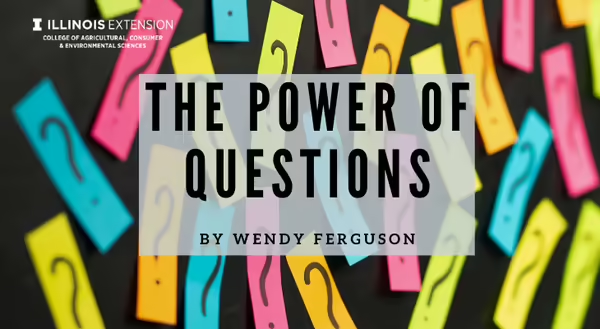
“Why”? This just might be the single most recognized question asked by children everywhere. This simple word can open the door to a world of discovery for a child and annoy parents all at the same time. Behold the power of questions.
“We live in a world our questions create.” David Copperrider said and indeed science has shown us that we learn about our world through questions. Though questions, children can learn cause and effect relationships, the meaning of words and create a framework for how the world works. So what if instead of being annoyed at the questions, we joined them in the asking?
Questioning helps one form new and more complex pathways in our brains. With these new pathways our brains become more flexible and we are able to access information from different parts of our brain and not rely on the same old pattern. Sounds like, “teaching an old dog a new trick” to me.
Exploring the great outdoors together is a great way to start the questions flowing. And the more you ask questions about something, the more you start to appreciate the subject you are asking questions about. "Curiosity – asking questions – isn’t just a way of understanding the world. It’s a way of changing it." – Brian Grazer, A Curious Mind
An easy way to do this is to create a “Wonder Journal” (adapted from material by educator and author, Aimee Nezhukumatathil). The concept is simple, take paper and pencil outside and explore nature together and then write down all of the questions that pop into your mind. For example, “I wonder why cardinals are red?” or “I wonder what the fastest speed a hummingbird can fly is?” And then share your questions with each other. Talk about them. When you ask for your child’s input, you are telling them that you value their thoughts and they are important to you. Look up the answers later or not at all. The important part is to ask and to wonder.
In fact, you can even make up an answer to the question. A case in point. One day, my grandniece and I were out exploring the woods and we heard the leaves in the trees rustling in the wind. She asked me if I heard it and I said “yes, what do you think it is?” She replied, “It is the trees talking.” So, I asked, “what are they talking about?” to which she said, “They are having a party.” “What kind of party?” I asked. “A wedding”, she said. And just like that with the prompt of a few open ended questions, she had created a new world the two of us could share, a world of magic and wonder, and a memory each of us will remember for a very long time. (I did write about the experience in my own journal, so I wouldn’t forget the details. Hint, hint.) By the way, we also “discovered” that girl trees are tall and boy trees are skinny. Who knew?
So, take a moment to question and to wonder. Who knows, maybe by doing more of the verb, wonder we will create more of the noun, wonder, in our lives. And at the very least, you might just discover a magical world.
“To be on a quest is nothing more or less than to become an asker of questions.” Sam Keen